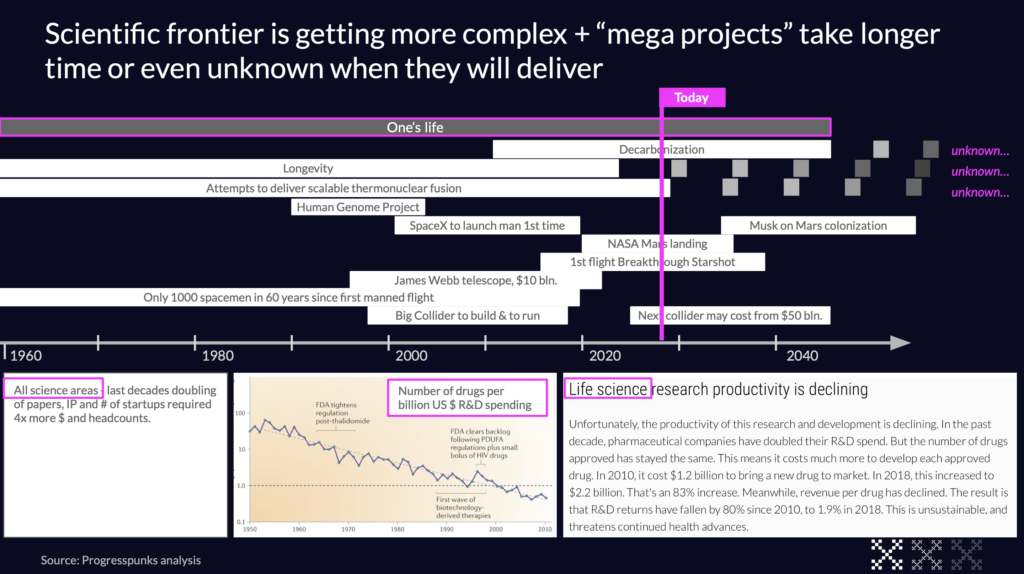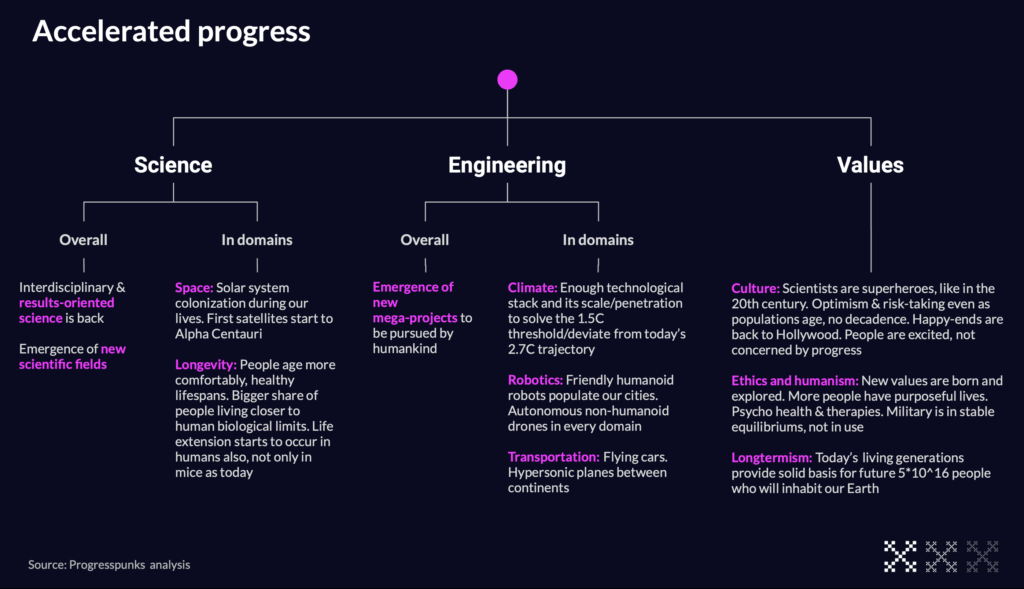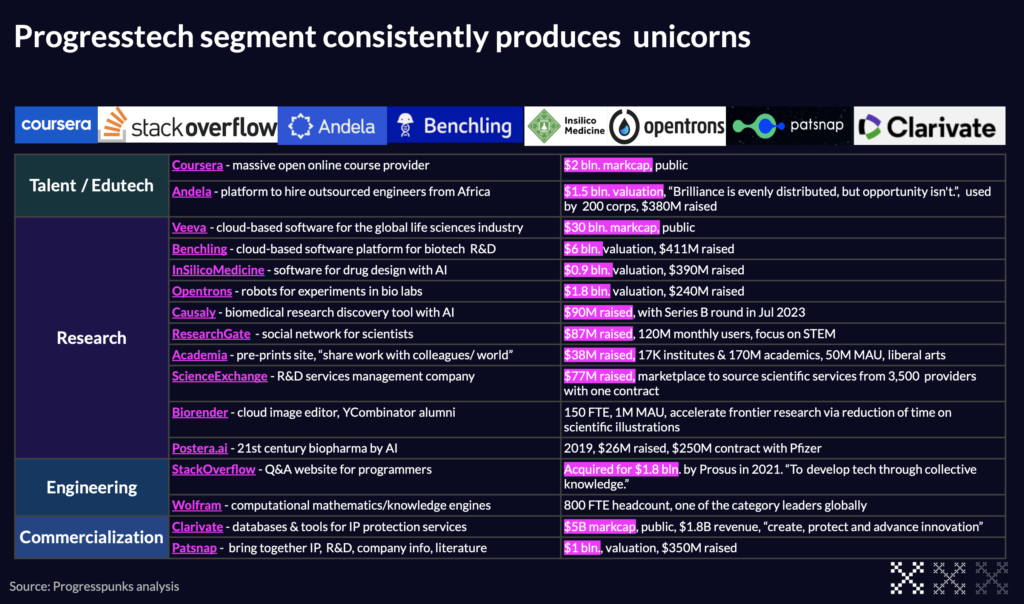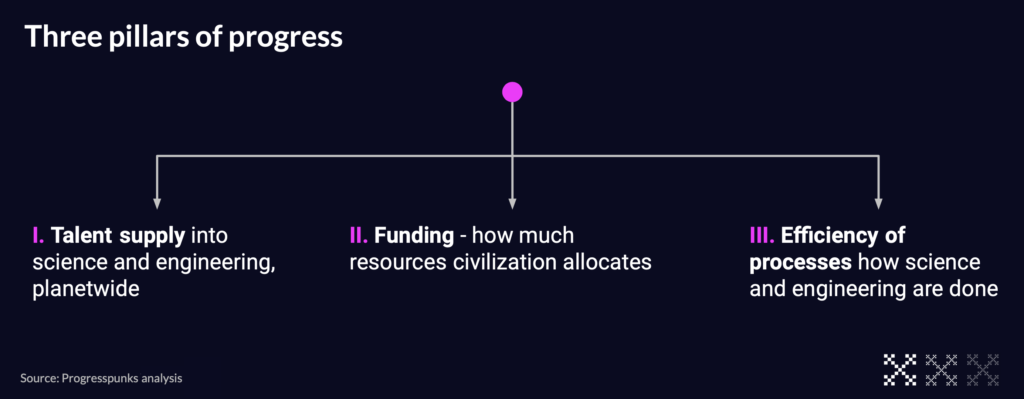Progresspunks exploit unconventional paths to accelerate science & engineering
I seek startups which build tools/services for scientists, engineers, academia, and commercialization. Let’s also chat on any other ways to radically improve R&D planetwide during our lives?

Victor Osyka, angel in 6 startups – 1 sold to Snapchat (Teleport), others raised $30 mln. – DeckRobot, Cattle Care, Mobalytics, GameLeap, Reason8. Earlier – VC, London business school, engineer. LinkedIn, x/Twitter, victor@progresspunks.com
Navigation: One big page, scroll or click: why accelerate progress, how progress may look, success stories of startups which serve scientists/engineers/commercialization, progress value chain/markets, progress bottlenecks, structured resources for founders, and prominent progresspunks across domains
Signal vs. noise: I write summaries of some interesting progress thinkers. I also structure spirituality
Why accelerate progress?
Technology is a knowledge on how to purposefully transform matter, energy or memes, “more for less”
- Progress of our technology civilisation is very impressive, e.g. energy in use, population explosion after Haber process, life duration, space exploration metrics, daily life automation & miracles
but
- Sometimes it is suboptimal, “we wanted flying cars instead we got 140 characters”, e.g. Peter Thiel 2013 or 2023, last decades we are kinda stuck in information technology? Even robotics is hard: 2 mins video how Boston Dynamics progressed from 1983 to 2022 = 39 years

How we will recognize that the progress is improved?
By results across domains and by changes in the culture (“society’s software”)

Examples of startups
Startups accelerate the pace of tech progress, fundamentally, in two ways:
- a) by automation of something or by using AI (“software is eating the world” (c) 2011) and/or
- b) by diffusion of best practices at scale how things are done within industries
There are some unicorns and scaleups which impact technological progress planetwide:

Coursera (wiki), Andela (wiki), Veeva (wiki), Benchling (story in Forbes, 2022), InSilicoMedicine (wiki), Opentrons (story at SOSV), ResearchGate (wiki), Academia.edu, ScienceExchange (wiki), Biorender (YC), PostEra.ai, StackOverflow (wiki), Wolfram (wiki), Clarivate (wiki), Patsnap (CB)
Value chain of the progress
Core stage, solving of reality puzzle, basically, is done by two polar approaches:
- Discovery of something really new, “from 0 to 1″ like Einstein etc. Such insights into reality are always like magic
- vs.
- Apply such known theories/methods/tools in every other field/scientific domain to get results everywhere
Value chain of the progress as a whole spans from origination of talent in populations and to distribution of technology at scale

Progress bottlenecks (startup opportunities)
Of course, there is an intrinsic feature of our Universe that scientific frontier became more complex/the low-hanging fruit has been picked. And some challenges are hard anyway, e.g.:
- $42.5 bln. spent on Alzheimer’s research since 1995 with almost no results
- Hundreds of thousands of scientists work on cancer
- etc.
But if we look at things which are within our control then all progress bottlenecks could be divided into 3 flows:

I. Talent supply
- Aging populations/finish of so-called demographic transition across developed and emerging countries
- Share of 25+ y.o. adult Americans with college or higher degrees is ~30% last 60 years
- 40% of students enrolled as STEM majors switched subjects or failed to get a degree
- Famous university education price bubble in USA since 1980s
- Sometimes people trained in STEM switch to corporate career paths (“great minds optimize click-through ratios of online ads”, “invent addictive entertainment experiences” etc.)
II. Funding
- Flat share (2%) of global GDP is allocated to R&D during last decades
- NASA funding last 10 years grew from $20 bln./year to $25 bln. (2% YoY), with only $5 bln. for launches
- Society-wide demand for science/electoral preferences
- e.g. Apollo program, now even a meme ‘Moonshot’ vs. today’s 1000 spacemen cumulatively since Yuri Gagarin in 1961, which is, think for a moment, only 1.5 spacemen per month
- Cultural fluctuations: today’s fears of technologies instead of Sci-Fi optimism in 1960-1970s
III. Efficiency of processes/how science and engineering are done
Basic research
- Exponential # of papers published every week, it is hard to be up to date even in narrow fields
- –> Overspecialization and lack of cross-disciplinary researchers
- Peer review crisis
- Problem with quality of papers so that others may not replicate results, so-called replication crisis
- Academic journals ask reviewers to work for free yet have $19 bln. profits from subscriptions with 40% profit margins (Elsevier, Black & Wiley, Taylor & Francis, Springer Nature, SAGE – 50% market share)
- Data silos, proprietary formats, proprietary data/paywalls
- Papers-oriented and less results-oriented science
Applied research
- Adoption of AI across disciplines and fields
Engineering
- “World of atoms”/deep tech is much more expensive than “world of bits”/software
- Every big corporation should have Bell Labs or Xerox Park or Google X?
Commercialization
- No comparable VC infrastructure outside of USA and some EU
Manufacturing at scale
- Slowed down in everything according to Patrick Collison’s list of cases how things were done fast
- One of explanations there: Mancur Olson argued that stable societies naturally tend to become less dynamic and more beholden to special interest groups with time or Fukuyama argued that interest groups have now made the US a “vetocracy”
Industry specific bottlenecks: Longevity
- No biomarkers/clocks/measurements of aging are known yet, so it is unclear what exactly to seek
- No shared theory of aging but a few dozens of theories
- Low conversions for majority of any drugs from success in animal trials into effectiveness for humans
- Other longevity bottlenecks, according to Longbio Fellowship survey in August 2023, include:
- Lack/expensiveness of predictive models
- Long regulatory paths/preference for no-risk intervention
- Funding, e.g. the NIH is by far the biggest funder of biomedical research in the world. Of its $50 bln. budget, only $300 mln. (less than 1%) are dedicated to basic aging research
Resources for founders and wannabe founders
I structured along 6 core stages of a startup’s/founder’s way links to the most succinct and applied best practices I know:

- Decide/self determination + open-mindedness + find co-founder(s). Doesn’t need investments
- Build MVP (minimum viable product) to check initial vision/hypotheses. Could be done in a part-time. Angel funding may be needed
- Reach PMF (product market fit), which is proven by either stable revenue growth or viral/exponential adoption if no revenues. Seed funding by VCs
- Growth, growth hacking and team scaling. So-called Series A funding by VCs
- Late stage –> Unicorn. How to delegate everything through teams. Series B..C..D etc. funding by VCs & PEs
- Exit and growth after it, usually via M&A or [rarely] via IPO
Each such stage from I through VI assumes solving of a few core issues (click on this link for all structured details and must read URLs)
Prominent progresspunks
Below I collect the most impressive progresspunks working towards progress acceleration:
Thinkers, futurists, influencers
- David Deutsch, invented theory of quantum computing, says that progress is insatiable and we always live in the beginning of infinity of future discoveries
- William MacAskill, longtermism philosopher, in a book “What we owe the future” (2022) that we should already optimize life for future 10^16 people to be born in 500 mln. years. Belongs to the tribe of effective altruists. Ideas of longtermism are actually 50 y.o., for example by William Ophuls and his recap Apologies to the grandchildren
- Jeremy Rifkin, that the Earth is a totally interconnected biosystem, and neoliberalism mispriced ecological externalities last century, his book Age of Resilience
- Ray Kurzweil, 25 years of successful futurology predictions based on a school of exponential thinking, projecting it from computers to everything. An idea of singularity was invented by John von Neumann in 1958 and popularized by Vernor Vinge
- David Chalmers, philosopher of consciousness, simulation hypothesis/VR, popularized Libet’s definition that consciousness is a subjective experience with pieces of qualia
- Max Tegmark, astrophysicist and a proponent of a theory that our universe has 4 types of parallel universes and is a mathemical object itself
- Lex Fridman, AI researcher turned podcast host, does deep (and long =) interviews of various progress stakeholders
- Entire e/acc movement
Nonprofits
- Institute for Progress of Erik Schmidt, US-focused think tank pushing progress of science & engineering through metascience advocacy and liberalization of immigration policy
- ARIA, like DARPA but in the UK. DARPA is a unified military/dual use R&D agency after USSR launched Sputnik, delivered many breakthroughs – materials, Internet, stealth etc.
- Breakthrough Prize by Yuri Milner, awards for scientists like Hollywood stars. Also, Yuri wants to send tiny satellites to Alfa Centauri at 20% of the speed of light to seek alien life (Eureka manifesto)
- Chan Zuckerberg Initiative, longevity and biotech research/open source through software/communities/edu
- Arc Institute, research organization (bunch of labs) with belief that important scientific programs can be enabled by new organizational models, focused on biomedical areas initially, with $650 mln. committed to basic research by private donors
- Good Science Project, an advocacy group that’s pushing gov agencies to make their science grant making more innovative and efficient (more experiments, less bureaucracy)
- Science Philantropy Alliance, works to increase giving to science research
- Foresight Institute futurology seminars on nano, longevity/biotech, neurotech, existential hope
- Giving pledge – socialistic movement from the heart of capitalism? The world’s wealthiest people commit majority of their wealth to philantropics during their lives ($600 bln. by 236 people from 28 countries), initiated by Bill Gates & Warren Buffet since 2010
New policies/new types of communities
- Pronomos, by Patri Fridman, grandson of libertarian economist Milton Fridman, develops charter cities around the world
- Startup Societies Network, network of experiments around the world in new forms of governance (“don’t argue – build alternative”), they see it as an intersection of legal (e.g. SEZ), digital (e.g. blockchain people, DAO’s) & offline (e.g. ecovillages) domains
- RadicalXchange, Vitalik Buterin’s & Glen Weyl’s movement for next-generation political economies
- // ? Guys, who are the best players in UBI experiments ? //
Academia founders
- SIT then Constructor University in EU by serial tech founder Serge Bell and graphene inventor Konstantin Novoselov
- Singularity University of Peter Diamandis, that corporations and founders can implement exponential thinking in their daily work across any biz & any geo
Science as a cross-disciplinary thing
- Santa Fe Institute, at Los Alamos nuclear hub, cross-disciplinary research of complexity
- Steve Wolfram, tries to explain physics/world through cellular automata concept
Science in longevity
- David Sinclair, that longevity is based on epigenetics
- Aubrey De Grey, that life extension could be solved through SENS
- DeepMind did Alfafold for prediction of proteins 3D structure (200 million predicted structures, virtually all known proteins), yet we are waiting for acceptance/results from academic community
- Calico by Google, that longevity could be solved as a software code
Biotech founders
- Noubar Afeyan, with its VC and incubator of biotech companies Flagship Pioneering, they did, among other things, famous Moderna with its mRNA COVID vaccines
- Human Longevity, research startup of Peter Diamandis and DNA inventor Craig Venter
- Retro Biosciences, by Joe Betts-LaCroix to expand comfortable aging span by 10 years
- Neuralink of Elon Musk and Max Hodak and their non-invasive competitor Synchron
Energy founders
- Last Energy, small modular nuclear reactors (SMR) to solve energy needs of humankind forever (100x nuclear energy till 2040) + open source (!) reactor platform by Bret Kugelmass
- Various attempts to solve nuclear fusion, funded by Bill Gates, Sam Altman etc. (there is a joke “nuclear fusion is always 30 years away” =)
Aerospace founders
- SpaceX, started 20 years to build huge reusable rockets, solar system colonization as an insurance to Earth’s existential risks + new economic frontiers like by Columbus 500 years ago
- Blue Origin of Jeff Bezos, in addition to space tourism reusable rocket and Moon program, since 2021 is playing with regolith simulants to use as a source of solar panels on the Moon
- Varda Space, satellites for drugs manufacturing in zero gravity
- Mikhail Kokorich, with Destinus – hypersonic transcontinental jets on hydrogen
- Natilus, carbon neutral then hydrogen next generation wing-like cargo aircrafts
- Zee Aero, “flying cars” (ultra-light battery powered aicrafts) by Larry Page in 2010-2019
Tech founders
- Sam Altman and Greg Brockman, Open AI was initially a nonprofit research lab
- Golden, largest knowledge graph startup funded by Gigafund.
VCs and accelerators
- Breakthrough Energy by Bill Gates, decarbonized future through hugely funded deeptech startups, started in 2015 as a long term VC, $2 bln. of capital + $0.1 bln. in EU, 90 investments. My summary of his really cross disciplinary and macro book How to avoid climate disaster of 2022.02
- Steve Jurvetson, his Future Ventures, from reading strange papers and own space/lunar museum to counterintuitive non-tech investments and sitting on boards of SpaceX, Tesla etc.
- Founders Fund, many non-tech VC bets in the world of atoms, not bits only
- Gigafund by Luke Nozek, who left Founders Fund to catch the biggest companies on 20 years time horizon + says that most VC returns come from 1-2 companies per decade
- Khosla Ventures by Sun Microsystems founder Vinod Khosla is heavily exposed on non-tech startups
- DCVC, deep tech VC with focus on trillion $ scale of impact from its investments
- a16z of Marc Andreessen, that the Internet will be web3, they track core metrics here
- SOSV, accelerator from zero stage in biotech, robotics, climate with network around the world
(Let me know others? victor@progresspunks.com)
